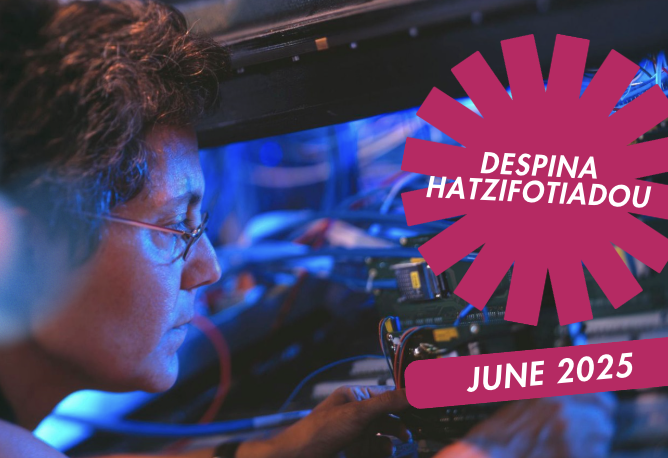This month, June 2025, IPPOG celebrates Despina Hatzifotiadou as our Outreacher of the Month. A long-standing member of the IPPOG community and the ALICE experiment's representative, Despina has dedicated years to combining frontier research with meaningful public engagement. Her work exemplifies the power of physics outreach to educate, inspire, and connect. Here, she shares her journey, reflections, and message for future generations.

Can you introduce yourself and share how you became involved in the world of scientific outreach?
I am an experimental particle physicist. I studied physics in Thessaloniki, Greece and did my PhD thesis based on an experiment at the Low Energy Antiproton Ring (LEAR) at CERN. After my PhD I came to CERN as a fellow and since then I am based at CERN, working on different experiments as well as on detector R&D. I am a researcher at INFN Bologna and since more than twenty years member of ALICE, the heavy-ion LHC experiment. I am also member of the Extreme Energy Events project (EEE), an experiment studying cosmic rays via an extended array of muon telescopes installed in more than fifty Italian high-schools, which combines outreach with scientific research.
My involvement with outreach started with guided tours as a CERN guide and also during CERN Open Days. For the last fifteen years I have been the outreach coordinator of ALICE, and as such I have been contributing to the production of outreach material, such as videos, posters and brochures, as well as the ALICE exhibition at LHC-Point 2. I represent ALICE in IPPOG.
What has been the most meaningful outreach activity you’ve organized or participated in, and why?
The most meaningful outreach activity I have been involved with, since more than ten years, is the International Masterclasses in Particle Physics. The opportunity for high-school students to have a glimpse into the world of scientific research, not only following lectures, but with their hands-on involvement in the analysis of real data, and subsequent discussion with physicists, is, I think, a unique experience for them. I have been involved in the development of the ALICE masterclass on strangeness and I am member of the IPPOG steering committee of the international masterclasses.
I am part of the IPPOG effort to encourage new institutes and new countries to adopt the masterclasses programme. During the last ten years I have been to different countries (Malta, Mexico, Bosnia and Herzegovina, South Korea) doing masterclasses in order to introduce local institutes to the programme; which certainly needs investment of time and energy, but is very rewarding.
What inspires you the most about sharing particle physics with the public?
What inspires me most is the curiosity and enthusiasm of young people, and their fascination when they learn about the elementary constituents of matter and the fundamental laws of nature. On a personal level, my involvement with the dissemination of science helped me get out of my comfort zone, discover the variety of experiments in our field, think about the open questions and generally broaden my horizons. Sharing particle physics with the public also helps demystify science, making clear that scientific knowledge is not a privilege for the few but for all humanity.
What is the most important message you would like to convey to younger generations through your outreach efforts?
The message I would like to convey to younger generations is that, if they are interested in science, they should not hesitate to study physics or related sciences. The challenges one faces in research and the satisfaction when solving problems is fulfilling and rewarding. And there is no need to be a genius - just to love what you are doing and give the best of yourself to it.
With her unwavering passion for both science and education, Despina continues to inspire the next generation of physicists, especially young women who dare to imagine themselves at the frontier of discovery. Her journey, captured not only in words but also in the stunning images of her outreach activities, reminds us that science is not just about equations and experiments but also it’s about people, curiosity, and the will to share knowledge with the world.
We hope her story will light a spark in many future scientists to come.


